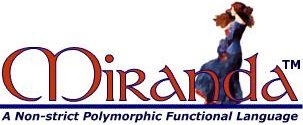This article includes a list of general references, but it lacks sufficient corresponding inline citations. (September 2016) |
 | |
| Paradigm | lazy, functional, declarative |
|---|---|
| Designed by | David Turner |
| Developer | Research Software Ltd |
| First appeared | 1985 |
| Stable release | 2.066[1] |
| Typing discipline | strong, static |
| License | 2-clause BSD License[2] |
| Website | miranda |
| Major implementations | |
| Miranda | |
| Influenced by | |
| KRC, ML, SASL, Hope | |
| Influenced | |
| Clean, Haskell, Orwell, Microsoft Power Fx | |
Miranda is a lazy, purely functional programming language designed by David Turner as a successor to his earlier programming languages SASL and KRC, using some concepts from ML and Hope. It was produced by Research Software Ltd. of England (which holds a trademark on the name Miranda)[3] and was the first purely functional language to be commercially supported.[citation needed]
Miranda was first released in 1985 as a fast interpreter in C for Unix-flavour operating systems, with subsequent releases in 1987 and 1989. It had a strong influence on the later Haskell language.[4] Turner stated that the benefits of Miranda over Haskell are: "Smaller language, simpler type system, simpler arithmetic".[5]
In 2020 a version of Miranda was released as open source under a BSD licence. The code has been updated to conform to modern C standards (C11/C18) and to generate 64-bit binaries. This has been tested on operating systems including Debian, Ubuntu, WSL/Ubuntu, and macOS (Catalina).[5][6]
- ^ "Miranda download page". Retrieved 17 May 2024.
- ^ "miranda: COPYING". Retrieved 17 May 2024.
- ^ Turner, D. A. (September 1985). "Miranda: A non-strict functional language with polymorphic types" (PDF). In Jouannaud, Jean-Pierre (ed.). Functional Programming Languages and Computer Architecture. Lecture Notes in Computer Science. Vol. 201. Berlin, Heidelberg: Springer. pp. 1–16. doi:10.1007/3-540-15975-4_26. ISBN 978-3-540-39677-2.
- ^ Hudak, Paul; Hughes, John; Peyton Jones, Simon; Wadler, Philip (2007-06-09). "A history of Haskell: Being lazy with class". Proceedings of the third ACM SIGPLAN conference on History of programming languages. New York, NY, USA: ACM. doi:10.1145/1238844.1238856. ISBN 9781595937667. S2CID 52847907.
- ^ a b Turner, David (2021-03-22). "Open Sourcing Miranda". Code Sync. London (published November 2020). Retrieved 2021-12-30.
- ^ "Miranda download page". www.cs.kent.ac.uk. Retrieved 2021-12-30.